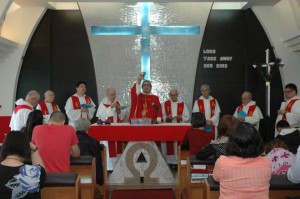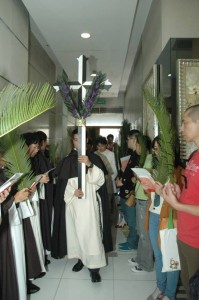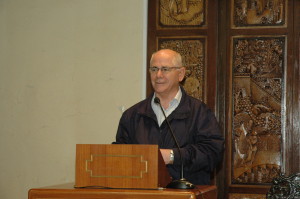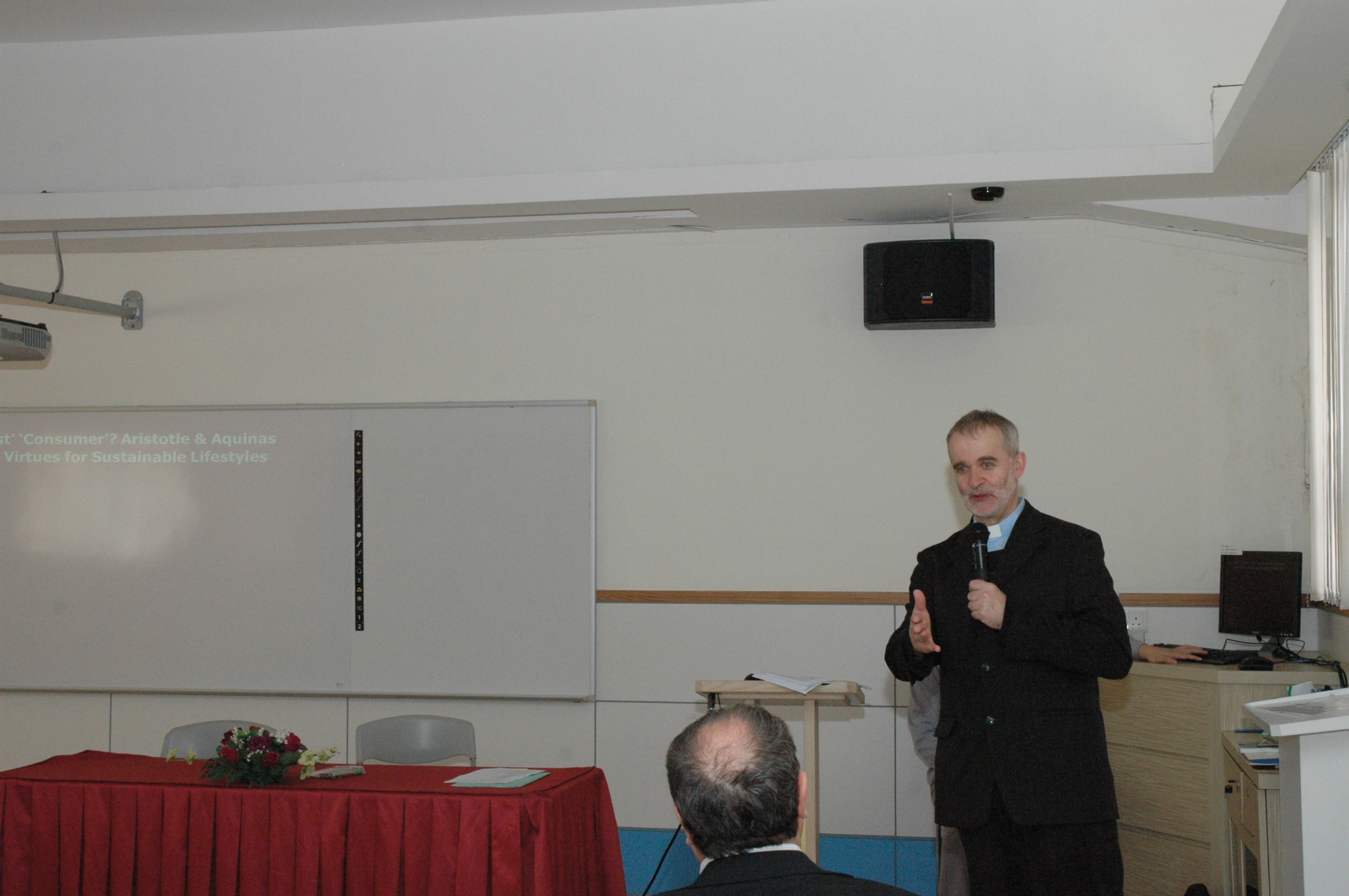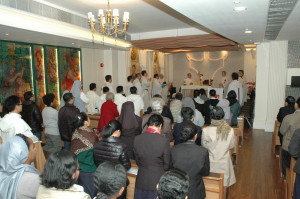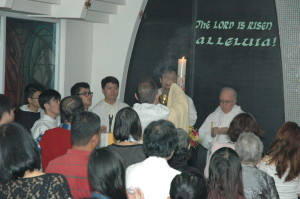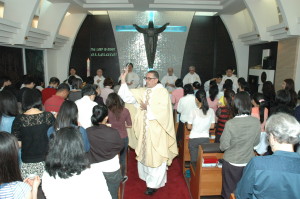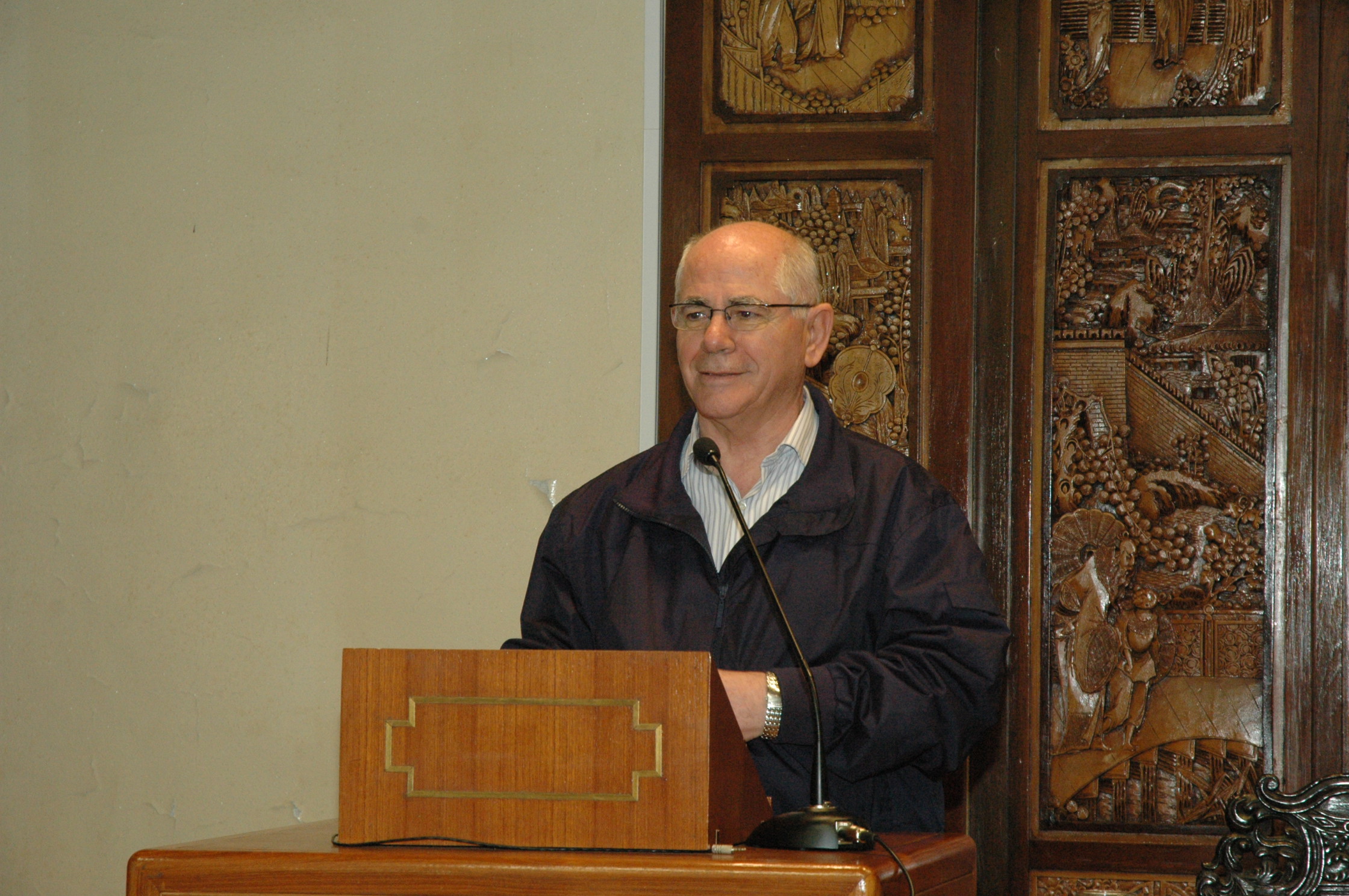
The quality of life in religious life
It is my purpose to share with you a reflection which I have been doing on religious life during the last few years. I am sharing with you what I have heard and seen in my contacts with men and women religious of different orders and congregations, of different charisms. All of it goes around two commitments which are present in our religious profession: fidelity to the gospel on one hand and on the other hand quality of life or the level of our personal satisfaction. Today I would like to put the accent on the quality of life. Which is the level of personal satisfaction today in religious life?
- The relevance of the quality of life in religious life
The ideal of the quality of life seems to be too secular, something proper of a society of prosperity and consumerism. In this society the quality of life is generally associated to a good health, good food, good living quarters, goods vacations, good diets, a good gymnasium, good look…, to the cultivation of external senses, of gratifying sensations, of enjoyment and comfort.
However, the ideal of quality of life has also reached a relevant place in religious life; the ideal of the quality of life is also legitimate among us. We have the right and the obligation to seek quality of life, for ourselves and for others. Quality of life is not incompatible with fidelity to the Gospel.
This ideal o quality of life has two different yet complimentary dimensions in religious life. In the first place, it makes reference to the evangelical quality of us, men and women religious. A life with quality means, in this case, a life with all the fundamental elements of a real evangelical life: a life of hope and charity, a life of poverty, chastity and obedience, a life of fraternity or sorority, a life of generous mission and service to l the people.
But, in the second place, the ideal of quality of life has another meaning regarding the level of personal satisfaction. A life lived with quality is a life capable of proportioning personal satisfaction, a life in which personal satisfaction is really deep and is finally related to one’s vocation, to communitarian life, to apostolic mission. This personal satisfaction is expressed in the form of enthusiasm, optimism, joy and apostolic zeal… The lack of this personal satisfaction, due to the lack of quality of life, is manifested in the lack of enthusiasm, lack of optimism, deep sadness, monotony and routine…
As a consequence, it is not an irrelevant purpose which is at the stake when we speak of the quality of life in religious life. It is not optional to seek the highest levels of personal satisfaction in this sense. It is not forbidden to be happy; in fact it is a right and a personal obligation.
In religious life, quality of life can produce personal satisfaction in three fundamental levels: the personal level through the experience of faith, the communitarian level through a real harmonious living together, and the apostolic level through mission, done and enjoyed. I am going to briefly meditate on these three levels of quality of life in religious life.
- The quality of life, faith and meaning of life
Few years ago, the Jewish psychiatrist, Viktor Frankl, passed away. He was a survivor of the Nazi concentration camps. He wrote a book telling his dramatic experiences –and those of his companions– in the concentration camps. This is the title of his book: “Man in search for meaningâ€. Going to the University, almost every morning I saw a reader of this book in the metro in Madrid.
The thesis of this book can be formulated this way: “The fundamental problem of human being is not in the lack of pleasure, for without pleasure he or she can still live; the fundamental problem of human beings is the lack of meaning; when somebody does not find any meaning at all to his or her life, could only end in suicide. This cannot be said more and better. When applied to religious vows this statement of Viktor Frankl makes us think: What is the problem of the vows for many men and women religious? Is it the lack of enjoyment or the lack of meaning?
Gordon Allport, the writer of the prologue tells us that sometimes Viktor Frankl received patients in his clinic with the following question: “Why did you not commit suicide?†The query sounds a little or even very brutal, yet it has its reason. Once composed after the surprise, the patients would give answers like the following: I did not commit suicide because my children are still little, because the business had not been consolidated, because I imagine the suffering of my wife, etc. By then, the psychiatrist begins his work of “logotherapyâ€: you still have some reason to continue living, your life still have meaning…
I suppose that saying this may sound too exaggerated in front of religious men and women. But there are two facts which we can observe in religious communities. In the first place the expression “this is meaningless†can be heard in our communities. I have heard this expression to some religious men and women in confession, when in those moments they express the deepest sensations of their own lives. This expression is a sign of alarm.
In the second place, at times a sensation of certain sadness appears in religious communities. Frequently it is not the expression of a passing and provisional crisis, but a certain monastic acedia, a kind of sadness embedded in the center of life.
Both facts manifest that quality of life in religious life is not too high and show a low degree of personal satisfaction which is basically due to the lack of meaning. I am not speaking in the moral level, of evil persons, of unfaithful person, of dissolute religious… No, I speak simply of the possibility that this lack of meaning could be the real crisis in religious life, the deepest sadness that is encrusted in the soul.
Not religious people can have other sources of meaning:  economic success for a businessman, professional success, life as a couple for a married person, children for parents… In religious life the only source of sure meaning is faith, the experience of faith. How to find meaning for poverty, chastity, obedience, common life and mission without faith?  That is why, the great problem of religious life today is the problem of faith; the rest, like poverty, chastity, obedience, living together… are important problems but are secondary and easier to handle. I heard this from Fr. Tillard in the seventies in Madrid. At that time I did not understand, now I am absolutely convinced that this is a great truth in religious life.
Certain secularization had caught religious life in the post-conciliar period and had weakened the faith among many men and women religious. Let us not confuse faith with piety or with moral perfection. This is not about being more pious or more perfect; it is about being more believers, about finding the source of meaning and foundation of our life in faith. To build the house on the rock.
This is the place to meditate about the wonderful Gospel image of the house constructed over rocks and a house constructed upon sand.
Faith is a gift, we know that. But we can put some exercises in order to cultivate, to sustain our faith. Today in religious life we should implement three necessary exercises to strengthen faith as a source of meaning and motivation in our life and mission.
In the first place there is a need to exercise oneself in silence, both interior and exterior. We live in a world too much noisy. There are too many noises in the streets and in the environment; but there are also too many physical noises in the communities. We need physical silence for concentration.
And there is also a special need to exercise interior silence. There are too many interferences in the life of religious men and women. It is important to be attentive to what is happening in the world and especially to so many problems causing suffering to people, mainly to de excluded and marginalized ones. But neither all news are important, nor is it necessary to listen to them many times a day. If we are disturbed by all kind of novelties in politics, in sports, in the social life, in ecclesiastical gossiping, in new technologies… all these can lead us to superficial and banal life. There is a real need of silence in order to go into the depths of all things, to distinguish what is essential from that what is accidental, what is necessary from what is useless, what is absolute from what is relative… The evangelical scene of Martha and Mary has here a full significance.
In the second place, it is necessary to exercise oneself in solitude, “lived†or inhabited solitude, as it is called today in spiritual literature, to learn how to live with oneself in order to enjoy our own being, our own identity, our own vocation and mission. Something goes wrong in life when we need to run away from ourselves, to be always fleeing like Cain. One cannot run away from oneself only by getting mixed up with the masses that move about in the streets and in the commercial great shops; also one can run away from oneself through the window of internet or any other emergency outlet which leads a person to spare the challenge to be alone with oneself, to confront oneself naked and without any masks. Who is not capable of living with oneself is not capable of living with others.
In the third place, it is necessary the exercise of prayer and contemplative dimension of life. In religious life such an
affirmation is so obvious, that there would be no need of repeating it. But this is not out of place. Beside the times of communitarian prayer, religious man or woman should dedicate some times more to cultivate and exercise personal prayer and personal contemplation. Secularization is compatible with almost anything, except with the abandonment of prayer and celebration of faith. This is one of the conclusions which had been imposed on us, the so called liberal generation, the post-conciliar generation. If this source of meaning is blocked, most probably a religious person could be left in the worst dark night, in a meaningless life, in a lifeless faith, in a monastic acedia, in a chronic sadness.
- The quality of life, the community and the quality of living together
At a communitarian level, quality of life in religious life and probably in any type of life depends mainly on the quality of our human relationships. There is no question that the greatest part of in-satisfactions among the members of religious communities has something to do with the problem of living together. And at the same time, there is no question that the greatest satisfactions among the members of religious life have something to do with a communitarian atmosphere which is humanely healthy and evangelically harmonious. The level of personal satisfaction, the level of quality of life depends mostly on the maturity of our fraternal or sisterly relationships. It is certain that today individualism today is being widespread. In some way it cultivated as an emergency exit for the problems or the weaknesses of our communities. But the result of individualism seems to be less positive than a poor communitarian life in terms of quality of life and personal satisfaction.
There is no mystery in which I am saying. This only reflects an elemental postulate of anthropology: the fundamental success in the life of a person consists in the success in love and communication. (It is supposed that I am not speaking of being in love nor any form of romanticism). I am speaking of the success in personal communication, which consists in the mutual recognition of the dignity of persons, in taking into account and being taken into account, in the mutual offering and receiving supports, in the interchange of experiences… etc. In other types of life there are other rules in order to measure success or failure, but in primary groups there is no greater failure in the life of a human being than the awful sensation of not loving anybody or not being loved by anybody. This is the sensation of absolute solitude, the state in which all sources of meaning and all sources of authentic personal satisfaction are closed down.
We live in a paradoxical world. Never people had had enjoyed so much means of communication and never did people harvest so much solitude; never so inter-connected and never so uncommunicated; never so surrounded by contacts and never so alone… Is this also true in religious life? For some time, I began to question myself of the repercussion that the computer have or is having in religious life, in the community life and its members. I continue hoping that somebody would continue the study of this topic with professional qualification.
That is why, it is frequently said that the most extensive malady in this consumeristic and individualistic society is solitude, “la soledad deshabitadaâ€, solitude as an emptiness of oneself, empty of God and empty of everything. And this solitude is a very close sister to desperation and depression. Are they perhaps calling at the doors of the convents or they are already in our midst?
Few months ago, a Dominican Provincial told me that when he began his first term as Provincial, eight years ago, he would usually ask this question to the friars: ‘How are you?’ Some replied: ‘well’. Others: ‘more or less’. And some answered to him: ‘I feel sad’. Lately he has observed that in making the same question some answered: ‘I feel very much alone’. This is a sign of alarm. Among other things we should be aware that individualism promises too much personal satisfaction at the beginning but at the end the result is usually this answer: “I feel very much aloneâ€.
In the post-conciliar period, good efforts have been made to recreate the communitarian life. In order to achieve this goal we demanded help from the human sciences, psychology, pedagogy, the process of human resources, the mediators of conflicts… But we have discovered that human sciences are not sufficient to sustain the communitarian life in a religious community. It is necessary to appeal to theological resources. The problem of the post-conciliar period is that in many cases, religious life had not been capable of substituting the communitarian rigid discipline of those classical communities with the communitarian mystical demand of an Evangelical community. And thus a weakening of communitarian life has taken place and sometimes also a deterioration of common living.
In order to reconstruct the communitarian life and to guarantee the quality of living together, it is necessary to recuperate some theological fundaments of the religious community and to put some communitarian exercises. Among others the following are being pointed out:
1) Taking the conscience of a common vocation, all brothers and sisters had been called by the Lord; as a consequence, everyone has the right to share this life, despite differences and deficiencies, and they are worthy of all respect and consideration.
2) To make conscience of our common faith and to exercise in sharing our faith. In order to live in community in a healthy living together, it should be enough for us to be capable of praying together the creed, although we may have different theological opinions, pastoral options, political affiliations and different visions of things, But it would be necessary to share also the experience of faith. For this there is no need of spending the whole day speaking of God or pronouncing pious prayers, but it is necessary at times that we may speak from the perspective of faith about problems so serious as suffering, scandal, injustice, the poor, those who left the Church… Which are the topics of our conversation in our communities? In the Confer of Madrid, some years ago, someone answered: first, politics; second, sports; third, the disruptions of the computer.
3) The common celebration of faith. If this is lacking, immediately the religious community can transform itself into a residence of celibates, and nothing more.
4) The practice of fraternal correction and the communitarian practice of reconciliation. The lack of these practices, of these moments of community life in order to process communitarian problems, has very negative effects on the community and its members. If the practice of fraternal correction and the communitarian practice of reconciliation is lacking, living together will be deteriorating step by step, there won’t be any place to process our communitarian problems, and these problems will become at the end so normal even to the point that such situations which are anti-evangelical would be seen as normal.
5) The communion of goods and services or ministries. This sounds secular, but it has a deep theological meaning as a communitarian exercise. When private economies enter a religious community, the community is in danger of death and the members with private economy are already dead for the community. Sorry for speaking so strongly, but I am absolutely convinced of that. Aside from this there are some human aspects, profoundly human, which contribute to the quality of living together: education, communication, the democratic habits, the capacity to speak and to address all problems openly with public words, feasts and celebrations, and a special attention to the sick, the aged and persons in difficulty.
- The mission and quality of life
When we speak of mission, usually we think of an obligation, a burden, or we are worried especially about the success and failure. Religious life today is making an effort to see the mission also from another perspective: why don’t we see mission as an essential factor of quality of life, of personal satisfaction? Why don’t we see it as something to enjoy and as a source of personal satisfaction?
A life with mission is full of meaning, it is a full life. A life with a mission accomplished is an enormous satisfaction. At the end of life, when death is in front of a person, and there is no place for lies and theatrical representations, I have heard many times these words: “Father, mission accomplished, I am prepared, whenever God wants me to go.†It must be wonderful to end our days like this.
A life without mission is a life without meaning; it is a life that is empty and failed. A life without an accomplished mission or with a mistaken mission causes great anguish, especially at the end, when the hour of the truth comes. At that moment I have heard some person saying things such as this: “Father, I have mistaken in life, I have misspent my life. May God forgive meâ€. Of course God will forgive us, but we have only one life to live. And we must be very attentive not to spoil it. Al life goes by and we look back on it, we realize how painful the times with no mission can be, and what a great satisfaction is felt for the times generously dedicated to mission, to serve the people.
Mission in the religious life has some special characteristics.
First: It can be motivated by the need to earn a living. This is not a sin, but neither this is the most evangelical of motivation. However, it would not be bad that in religious life, all men and women would be conscious of the obligation of any human being to work in order to earn his daily bread.
Second: Mission in religious life must be motivated, especially by apostolic zeal, overcoming thus the mere economic criteria. In many cases, economic necessity does not put any pressure on the individuals in religious life. Then if apostolic zeal is lacking, probably some religious will go in voluntary retirement or will forget about any mission. In the meetings of the Major Superiors in Rome few years ago, it had already been denounced that the use of “retirement†by some members in religious life is dangerous. A retired (friar) must continue to pray, to preach, to celebrate, to attend people…
Third: Given that in religious life responsibilities are originally communitarian or institutional –the Congregation, the Province is taken care of everything- and in some way the superior is responsible for everything, this situation can degenerate in a dangerous system regarding work. If the individuals are not adults, mature and responsible, if they have not personal mysticism, they could easily surrender to comfort and personal irresponsibility, for this system of life surrounds us with securities and guarantees everywhere.
The central thesis in the theology of religious life is that the basic mission of religious life is to bear witness to the Gospel.
For this mission, all men and women religious are competent, whether they be young or old, healthy or sick, in working age or retired… In this sense, the moral and evangelical behavior of the individuals is not a topic of freedom or of personal option. “I am free and I can do what I wantâ€. It is an obligation born by the fact of living in an apostolic community: no one has the right to discredit the service (ministry) of the brethren, (which is) the ministry of the community. From here we could well understand what Saint Paul wants to say: “so as not to discredit the ministryâ€.
Concerning mission, many things could still be said. But allow me to say something more. Mission may be sometimes laborious and tiring, but even so it can and should contribute to the quality of life and produce personal satisfaction.
When I was a student, I heard a professor saying: “I only preach when I am commanded by the priorâ€. It is not that I was fully
scandalized by this, but yes, a little bit. Because I could not understand that this could be said by a member of the Order of
Preachers. What would Humbert de Romans say about this friar? Humber was a Dominican of the thirteen century who wrote a wonderful book about the instruction of the preachers. The conclusion which I can get today, after many years in the Order, is that for that religious, the mission of preaching was a burden, a penance…
Well, I believe that in order that the mission may form part of our quality of life, in order that the mission become fountain of personal satisfaction, it is necessary to learn how to enjoy mission, even when mission suffering, failure, sometimes frustration… Personal satisfaction of an accomplished mission is not enough; it is also necessary to learn how to enjoy the mission.
This can happen in two ways: 1) Enjoying the short distance relationships: to enjoy seeing the children or the young people grow up in our schools, to see the faithful grow in Christian life in or parish; to see a person finding the meaning of life through our words and through our simple presence, to see a couple recompose their relationship thanks to our companionship.… This is to learn how to enjoy mission. To enjoy mission this way we need to educate our affections and celibacy, and not to transform this into a defensive wall against any human affection.
2) Another way is to enjoy long distance relationships. Sometimes we have to work for people we never will see. We do not even know who will benefit from our mission. Nobody will come to say thank you. For example, being committed to justice and peace (“I have family in Iraqâ€), for human rights in the world, even the government today in religious life, writing a book when you do not know who can benefit from it (if any), etc…
Thanks to a mission accomplished and enjoyed we shall say at the end of our days: “Lord, our life on earth has not been in vainâ€
FelicÃsimo MartÃnez, O.P.
Macau, March 25, 2015.

